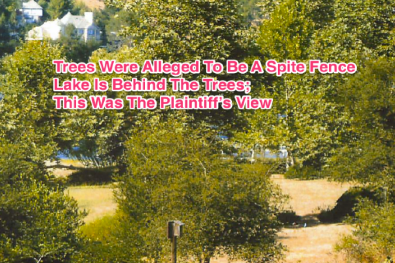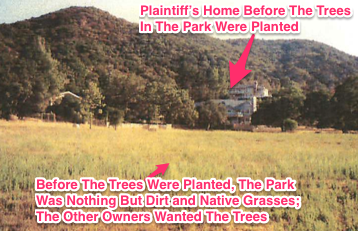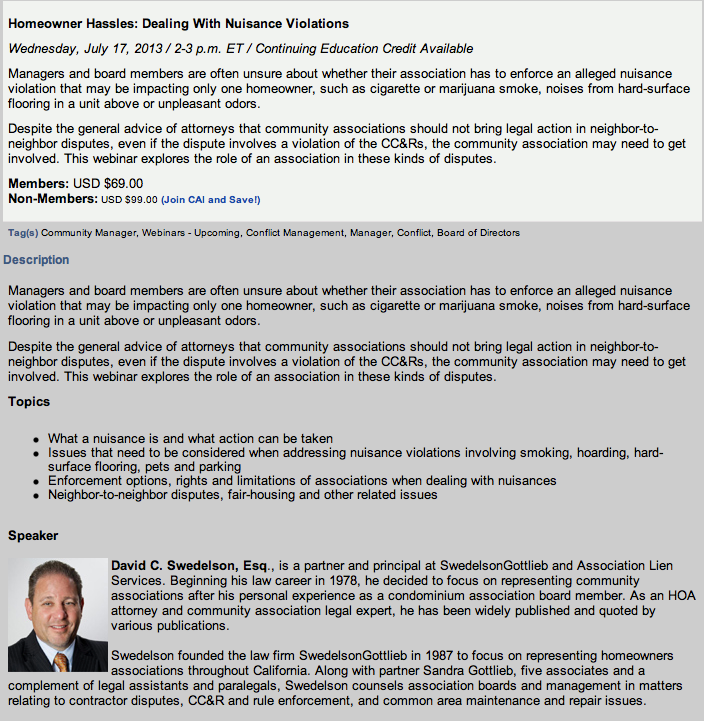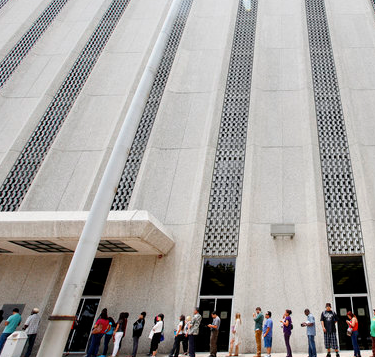By David Swedelson, Senior Partner at
SwedelsonGottlieb, Community Association Attorneys
 A longtime client of the firm was sued by a woman that did not live in the association who claimed that our client had illegally obstructed her view of a lake owned by our client association. After a jury trial on the sole cause of action that was left after we prevailed on a motion for summary adjudication knocking out all of her other frivolous claims, the jury decided that there was no spite fence. This result was not a surprise as the plaintiff was not entitled to her view of the lake, no matter how precious it was to her.
A longtime client of the firm was sued by a woman that did not live in the association who claimed that our client had illegally obstructed her view of a lake owned by our client association. After a jury trial on the sole cause of action that was left after we prevailed on a motion for summary adjudication knocking out all of her other frivolous claims, the jury decided that there was no spite fence. This result was not a surprise as the plaintiff was not entitled to her view of the lake, no matter how precious it was to her.
Here are the facts: the plaintiff’s home bordered a park that the association owned and maintained and she was entitled to use the park. The park was between the plaintiff’s home and the lake, hundreds of feet separating her home from the lake. The park had been, at the time the plaintiff built her home, unimproved except for two 200 year old oak trees that partially obstructed her view. Otherwise, the park was made up of dirt and native grasses. Her neighbors wanted the park improved and prevailed upon the developer of the association to improve the park as was required by the development documents and the county.  The plaintiff did enjoy a view of the association’s lake. But her view became obstructed several years later when the trees that the association’s developer planted grew up.
The plaintiff did enjoy a view of the association’s lake. But her view became obstructed several years later when the trees that the association’s developer planted grew up.
The plaintiff’s property, while not part of the association, is part of a community association, which unlike the association that is our client, is not a mandatory membership community association. It is a voluntary association, formed to manage issues of the homes in and around the plaintiff’s home (which homes were built before the association was formed). The plaintiff acknowledged that there were no restrictions on the land that require that she be provided a view or that require that our client association provide the plaintiff with an unrestricted view of the lake.
[NOTE: In the 1986 case of Pacifica Homeowners Association v. Wesley Palms Retirement Community, the California Court of Appeal concluded that “[a]s a general rule, a land owner has no natural right to air, light or an unobstructed view and the law is reluctant to imply such a right.” However, “such a right may be created by private parties through the granting of an easement or through the adoption of conditions, covenants and restrictions …”]
Continue reading
 There has been some confusion as to whether a community association’s trustee, after a nonjudicial foreclosure sale (for the collection of delinquent assessments), may record a trustee’s deed upon sale prior to the expiration of the 90-day right of redemption required by California Civil Code Section 1367.4 and California Code of Civil Procedure Section 729.035. A plain reading of California law provides no explicit answer.
There has been some confusion as to whether a community association’s trustee, after a nonjudicial foreclosure sale (for the collection of delinquent assessments), may record a trustee’s deed upon sale prior to the expiration of the 90-day right of redemption required by California Civil Code Section 1367.4 and California Code of Civil Procedure Section 729.035. A plain reading of California law provides no explicit answer. 




 It is not uncommon for a condo association or HOA to become embroiled in some sort of dispute or litigation as a defendant, having been named in a lawsuit by a disgruntled owner. The lawsuit comes in, and after being evaluated to determine if it is a case that should be defended by the Association’s insurance carrier, it is tendered to the carrier. The fact that the Association has been named in the lawsuit raises several questions:
It is not uncommon for a condo association or HOA to become embroiled in some sort of dispute or litigation as a defendant, having been named in a lawsuit by a disgruntled owner. The lawsuit comes in, and after being evaluated to determine if it is a case that should be defended by the Association’s insurance carrier, it is tendered to the carrier. The fact that the Association has been named in the lawsuit raises several questions:  Breaking news! The Community Associations Institute released the following report today:
Breaking news! The Community Associations Institute released the following report today:
 A longtime client of the firm was sued by a woman that did not live in the association who claimed that our client had illegally obstructed her view of a lake owned by our client association. After a jury trial on the sole cause of action that was left after we prevailed on a motion for summary adjudication knocking out all of her other frivolous claims, the jury decided that there was no spite fence. This result was not a surprise as the plaintiff was not entitled to her view of the lake, no matter how precious it was to her.
A longtime client of the firm was sued by a woman that did not live in the association who claimed that our client had illegally obstructed her view of a lake owned by our client association. After a jury trial on the sole cause of action that was left after we prevailed on a motion for summary adjudication knocking out all of her other frivolous claims, the jury decided that there was no spite fence. This result was not a surprise as the plaintiff was not entitled to her view of the lake, no matter how precious it was to her. The plaintiff did enjoy a view of the association’s lake. But her view became obstructed several years later when the trees that the association’s developer planted grew up.
The plaintiff did enjoy a view of the association’s lake. But her view became obstructed several years later when the trees that the association’s developer planted grew up. Every board of directors for every condo or homeowners association has been there; the board wants to do something that it should be “obvious” that the association needs, such as a needed capital improvement to the common area, or an important amendment to the CC&Rs, but cannot muster up the required amount of homeowner votes to approve this “obvious” need. Whether this failure of approval results from the homeowners’ true opposition to the proposed change or whether it stems from owner apathy, a recent California court decision has made it clear that when the board advocates for votes for the approval of whatever is on the ballot, the board is a candidate, and as such, must provide equal access to media and the common area for others to advocate their positions on the ballot measure.
Every board of directors for every condo or homeowners association has been there; the board wants to do something that it should be “obvious” that the association needs, such as a needed capital improvement to the common area, or an important amendment to the CC&Rs, but cannot muster up the required amount of homeowner votes to approve this “obvious” need. Whether this failure of approval results from the homeowners’ true opposition to the proposed change or whether it stems from owner apathy, a recent California court decision has made it clear that when the board advocates for votes for the approval of whatever is on the ballot, the board is a candidate, and as such, must provide equal access to media and the common area for others to advocate their positions on the ballot measure.  After the Trayvon Martin shooting in Florida last year, I posted a blog article highlighting the need for community associations to supervise their volunteers.
After the Trayvon Martin shooting in Florida last year, I posted a blog article highlighting the need for community associations to supervise their volunteers.  California Legislative Action Committee (CLAC) Chair Pamela Voit has issued the following statement on AB 1360, authored by former Assemblymember and newly elected Senator Norma Torres, and co-authored by Assemblymember Richard Gordon, sponsored by the Community Association Institute’s California Legislative Action Committee (CAI-CLAC).
California Legislative Action Committee (CLAC) Chair Pamela Voit has issued the following statement on AB 1360, authored by former Assemblymember and newly elected Senator Norma Torres, and co-authored by Assemblymember Richard Gordon, sponsored by the Community Association Institute’s California Legislative Action Committee (CAI-CLAC).
 A few months ago I reported about
A few months ago I reported about